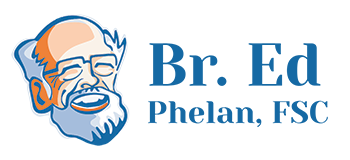Introduction
I’ve spoken with about 100 individual Brothers during the past year concerning their lifelong work with poor children and their families. In speaking about the past, they all had examples of teaching in elementary or high schools in poor neighborhoods, working in the institutions for child care, or at Lasallian colleges and universities. In talking about their current involvement, almost half spoke about their teaching, directing, managing, administering and most of the rest felt limited by age, health, or opportunities to serve.
After pushing the issue with this latter group, I found many of them are currently engaged in significant activities, including:
• Raising money for a San Miguel School
• Accompanying students on mission trips to urban areas and native american reservations, volunteer at Dorcas Place adult education program
• Tutoring special needs students or those in danger of dropping out
• Teaching Teilhard de Chardin to adult wisdom seekers
• Helping Palestinian students speak and write English in Bethlehem
• Diocesan Council of Religious, Brothers think tank
• Vocation promotion
• Food bank
• Board member
• Archivist
• Chauffeuring seniors from home to appointments and shopping
• Writing position papers for presentation to the UN Security Council
• Director of Senior Activities, DENA
• Taking university courses to connect with learning and learners
Many of the above men refer to their activities as a ministry of presence to people young and old. Some carried this notion to another level—for them, living mindfully with a focus on the present moment and in acceptance of their limitations was their ministry, the example of gospel values for all to see. Some in nursing care pointed to their peers in palliative care as teachers to all of us on how to embrace end of life. Personally, these interviews allowed me to experience a depth of spirituality in these men that I had never experienced earlier in my life. It was easy to move from their stories of service to their relationship with God, but they needed to be invited there.
These lengthy conversations also gave me an insight into our religious family — the De La Salle Christian Brothers of DENA. I realize this family is an organization and, as such, it has a group persona. For current Brothers like myself it is the way
we describe ourselves in public documents or in chapters. It’s our commonly
held opinions, attitudes and values developed over many years. It’s our culture.
I suspect we hold strongly to these because they emanate from our
organizational shadow.
Organizational shadow is a term that describes aspects of an organization that it doesn’t admit to having. Because they are hidden, they stop the organization functioning in a healthy and productive way. It is important to bring them to light so that the organization can be more honest with itself and more functional.
Carl Jung used the term “shadow” in relation to individuals. Jung’s shadow describes all the aspects of a person that he or she can’t face up to. As a result, the person represses them and then projects them on to others (angry people see anger everywhere, victims see injustice everywhere). I believe that organizations behave in the same way.
Jung said that, to be psychologically healthy, the person has to bring these features to light and integrate them into their conscious life. The same is the case
for organizations. This can help them face up to their shadow and to change
for the better.
Some of our traditional values can become part of the shadow even though they are rich and powerful, and in some cases the reason for the founding of the Brothers. But holding them tightly when the times, the needs of youth, and the membership of the order has changed is not holding tradition but rather traditionalism.

Leave A Comment